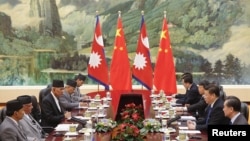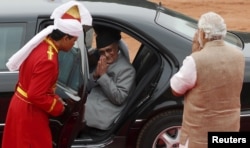Nepal’s Prime Minister K. P. Sharma Oli appears to be creating history on his visit to China, which began March 20 and ends this Sunday.
The prime minister has signed several agreements aimed at reducing Nepal’s centuries-long economic dependence on India, including a plan to create a railway thoroughfare from China through the Himalayas.
On Wednesday, Beijing and Kathmandu signed a deal under which China will supply petroleum products to Nepal, which has been dependent on India for this product. Beijing is also finding ways to reduce Nepal’s dependence on India for electricity by planning a transmission line across the border.
"Nepal can be a bridge between China and India," Chinese President Xi Jinping said Monday, putting his stamp of approval on the moves.
Xi has reasons to be pleased at the turn of events, according to analysts, as an earlier attempt to establish strong linkages with Nepal in 2008 did not succeed. The move has military connotations because the Himalayan Heights are a crucial strategic asset. Additionally, the Indian military has a close relationship with the Nepali forces and Beijing would be keen to dilute it, analysts said.
Oli said last week that Nepal wants to utilize seaports in China for its foreign trade. Currently, 90 percent of Nepal’s foreign trade passes through India.
“We have been an India-locked country. We are now developing a strong partner in China, and opening up new transit routes,” Rajan Bhattarai, a member of parliament from the ruling Communist Party of Nepal (Unified Marxist Leninist), told VOA.
Tunneling Himalayas
Many, however, regard these moves with skepticism because of Nepal's daunting mountain terrain, its cultural connectivity with India and Oli’s tenuous position in the Nepali political theater.
India has said Nepal is within its rights to seek other partners; but, some believe New Delhi may be concerned about the new situation because linking Nepal and China with railways would give the Chinese military a unique advantage over rival India.
“I don't think China would do anything in Nepal that would seriously hurt India’s interest and affect its own relationship with New Delhi,” Pramod Jaiswal, senior research officer at Institute of Peace and Conflict Studies in New Delhi, said. “China needs India’s vast market for goods and infrastructure construction a lot more than it needs Nepal.”
China's Foreign Ministry has acknowledged that the cross-border railway was still at the proposal stage, and that a feasibility study has not yet been done; but, analysts said the capability of Chinese railway engineers to take the Tibetan railway line to the Nepali border should not be underestimated. At one stage, Chinese officials talked about digging tunnels through the Himalayas to quickly stretch the railway line to the Nepali border.
Separately, Chinese railway engineers demonstrated rare tenacity as they laid tracks across the mountain ranges in Tibet.
Political opportunism?
The prime minister’s actions follow a massive border blockade created by agitating opposition forces, which stopped the flow of goods from India for weeks until it was resumed recently.
Nepal had accused India of supporting the agitators from the Madhesi community -- mostly people from Nepal’s plains with close links with India. They were opposing provisions in a new constitution that denied them certain rights. Oli has been forced to amend the constitution to accommodate the Madhesi demands.
“[The] Nepali prime minister is upset with India over the blockade. He wants to invite China to counterbalance India in Nepal,” Jaiswal said.
There is another reason driving Oli closer to China, according to analysts. His party does not have a majority in parliament, and depends on the Unified Communist Party of Nepal (Maoist), which is known for its pro-China stance.
“These two parties were rivals earlier. Many people believe China played a role in bringing them together,” Jaiswal said.
Nestled in the Himalayas, Nepal has been known to the world largely for Mount Everest, for the birthplace of Buddha in Lumbini and for being an almost 100 percent Hindu kingdom next to India. The country’s only political significance has been its role as the first stopover for Tibetans fleeing from China to India in the hope of seeing the Dalai Lama.
Observers say they believe China relies heavily on the Nepali army and police force for blocking the entry of fleeing Tibetans, and keeping a close watch on Tibetan refugees already settled in Nepal.
“Every country has its own reasons for enhancing friendship. We understand what issues are sensitive and important for our neighbors, and we try to do what we can for them,” Rajan Bhattarai said.





